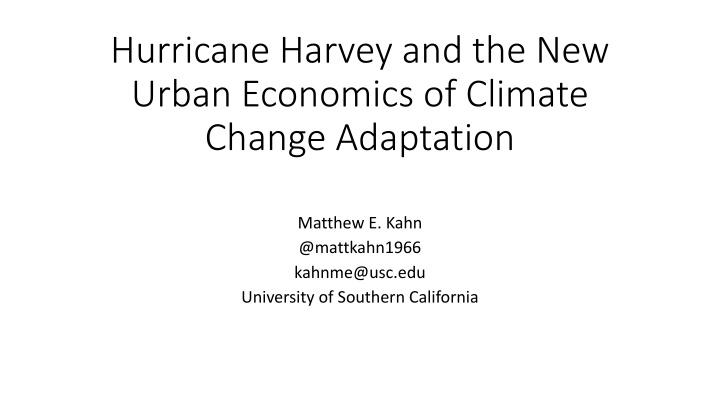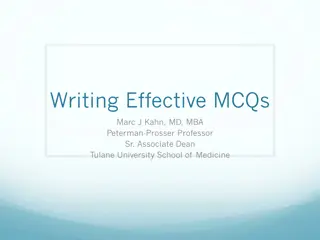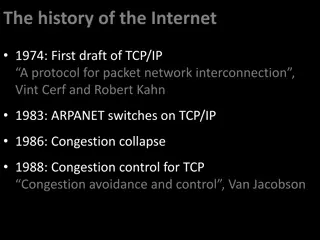
New Urban Economics of Climate Change Adaptation after Hurricane Harvey
Explore the implications of Hurricane Harvey on urban resilience and climate change adaptation through the lens of the new urban economics. Matthew E. Kahn delves into the Fat Tail Risk associated with extreme events like Harvey, the surprisingly low death rate, and the contrast between adapting to terrorism versus natural disasters. Discover how cities like Houston serve as bundles of diverse attributes, shaping their response to environmental challenges and societal preferences.
Uploaded on | 3 Views
Download Presentation

Please find below an Image/Link to download the presentation.
The content on the website is provided AS IS for your information and personal use only. It may not be sold, licensed, or shared on other websites without obtaining consent from the author. If you encounter any issues during the download, it is possible that the publisher has removed the file from their server.
You are allowed to download the files provided on this website for personal or commercial use, subject to the condition that they are used lawfully. All files are the property of their respective owners.
The content on the website is provided AS IS for your information and personal use only. It may not be sold, licensed, or shared on other websites without obtaining consent from the author.
E N D
Presentation Transcript
Hurricane Harvey and the New Urban Economics of Climate Change Adaptation Matthew E. Kahn @mattkahn1966 kahnme@usc.edu University of Southern California
Introduction Urban resilience as an attribute of urban quality of life, my 2010 Climatopolis book My 2015 paper Cities and the Environment (joint with Walsh) When 11 trillion gallons of water land in a small geographic space, implications for Fatality risk Damage to the capital stock Damage to local productivity
Adapting to Fat Tail Risk Hurricane Harvey is a leading example of a shocking event 11 trillion gallons of water falling in less than 1 week Weitzman s work on fat tail events features no spatial adjustment margins, assumes away a huge # of adaptation margins Shocks occur to places General equilibrium effects Shocks are partially anticipated We are risk averse Many of us know that we don t know what Mother Nature will throw at us
Harveys Low Death Rate 10 million people in the affected area and 80 deaths My 2005 RESTAT paper the Death Toll from Natural Disasters Why were there so few fatalities? The role of self protection such as evacuation The role of cell phones and directed search by first responders
Adapting to Terrorism vs. Natural Disasters (Kahn 2015) Geographic Persistence to natural disaster shocks Rational terrorist is more strategic and chooses targets at random so that we cannot prepare Spatial predictability of Mother Nature leads to capitalization of risk into real estate prices (implications for the poor!) Spatial predictability --- implications for insurance risk pricing and encouraging self protection Implications for infrastructure and zoning codes and density zoning
Cities as Bundles of Attributes If you met a space alien, how would you describe Houston ? Employment base, climate, home prices, culture, humidity, history, food Houston is known for energy, Republicans, cheap housing, humidity, and flooding. Houston = the American Dream ? For some yes , for others no We are diverse and we vote with our feet Houston attracts people who want cheap large homes. Millions have chosen to live there rather than San Francisco. Does Harvey change things ?
Sprawl = Private Benefits but Social Costs Houston has chosen to sprawl and to have more single family homes than San Francisco Paul Krugman This has had the unintended consequence of raising flooding risk By how much? Household Willingness to pay for Single family homes vs. an apartment in multi-family housing
But We Keep Rebuilding Do we learn from our mistakes? (behavioral economics and adaptation) Benefits of rebuilding, middle class housing that is cheap No free lunch Externality imposed on others; wetlands converted into concrete imposes flood risk on all, how big is this externality? private land trusts could purchase flood plain land and set it aside as wetland parks, reduce flood risk by x%.
Politics and Adaptation Place based congressmen seek infrastructure (ex-ante $) and rebuilding $ (ex-post) for their areas Two Deadweight losses induced by this activity Distortion in the location decision of people Standard DWL for paying or this expenditure
My New Work Kerry Smith and I are working on this issue A benevolent planner would upzone on higher ground and move urban activity to this area Taxpayer revolt against subsidizing risky living? Economic incidence of these implicit subsidies; home owners (not renters) in these areas Explicit discussion of property rights in a changing world (climate change shifts the bundled attributes of a given parcel of land) Are incumbent property owners residual claimants on bad news ?
Urban Productivity and Climate Change Endogenous adoption of air conditioning (Graff-Zivin and Kahn 2016), the most productive firms adopt air conditioning and hence aggregate industrial output is insulated. Short run shocks such as oil refining post Harvey --- If disruptions occur, capital will start to move to higher ground . General equilibrium price effects and spread out diversified production shield the macro-economy.
Rising Income Inequality in Houston? Boustan et. al. (2017) , 90 years of natural disasters When major disasters occur, population shrinks and poverty rate for a county increases. Poor owners will bear the greatest incidence of the shock. Poor people live in the highest risk areas and have the fewest adaptation strategies. The call for universal pre-K and a basic income level (Milton Friedman) become even more important in a world featuring rising climate change risk.
Urban Competition Those areas that attract and retain the skilled grow. Which geographic areas wins and loses if the Houston region doesn t compete well? Durable capital and Glaeser and Gyourko s 2005 JPE paper Bunten and Kahn (2016) and the economics of Lego, decouple capital from land or have a less durable capital stock. Even climate deniers will notice if their area suffers a brain drain
Tiebout Meets Harvey Open system of cities and system of neighborhoods within cities Local homeowners pay for their own defense. Use property taxes to buy property set it aside as wetland to reduce flooding What happens to those who can t easily move? (cheaper rents)
Conclusion We hold Undiversified portfolios Why? We have a job in a specific place and own a home and have our friendship networks and past there. Consider adaptation for an Asst. Prof who rents, she does not bear the incidence of place based shocks. Uncouple shocks to place and urbanites adapt more easily
The New Economy and Adaptation Uber Disaster ; peer to peer sharing of canoes and other rescue devices surge pricing ? (Titmus vs. Hayek) AirbNb and housing those who have been dislocated If the poor cannot afford this, crowdsourcing rescues and financing them. Forget egames , now the unaffected areas can actively help as a crisis ensues. The allocation of scarce resources to save lives during an increasingly risk time. Catastrophe bonds and risk rated insurance by land parcel Kahn, Jones and Nolan (2017 Harvard Business Review)




